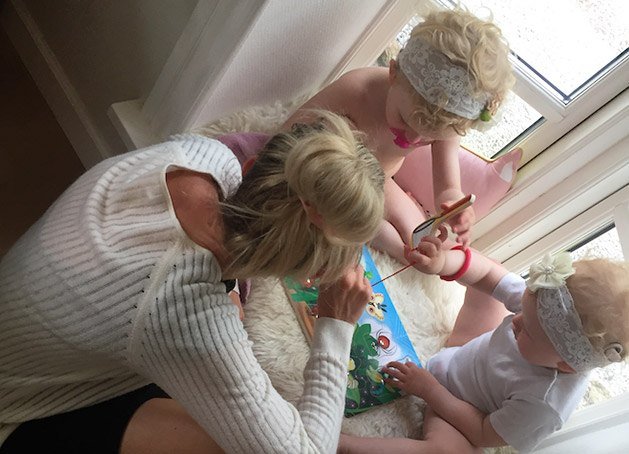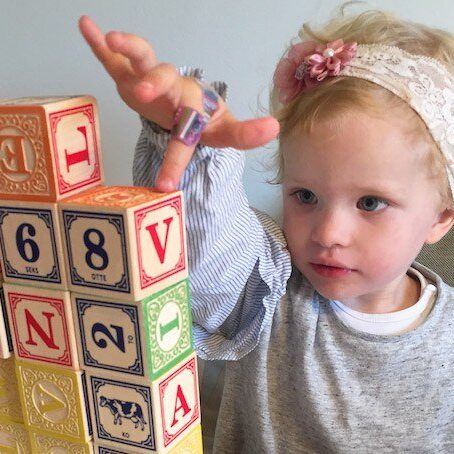Language development and play go hand in hand
Play time is often considered a mere diversion for children and is highly underestimated. However, it turns out that play is essential for the child’s general development and language skills. It is actually considered so important, that it is substantiated in the UN Convention on the Rights of the Child.
The following is written by Sahra Mengal, a prominent audiologist with many years of experience. “I am dedicated to helping children with language difficulties and have worked in both Denmark and America”
Why focus on play?
“In my work, I often see children thrive in learning through play. It is my sincere hope, that my experiences will inspire to more play in our everyday life”
So why is play so important for the child’s development?
When a child plays, it involves development on so many levels. They learn about themselves and their surroundings. Through play and interacting with other children and grown-ups, comes a sense of community and growing social skills. The child will learn how to react to and solve little conflicts in interaction with others and how to express their own feelings in a given situation. In play, there will be a need for communication and the child will learn how to express themselves and develop their language skills at the same time. Play is therefor essential for the child’s development, learning and language skills.
When and how does a child learn to play?
0-1 years
From early infancy, a child will try to explore their immediate surroundings. They will reach out for a rattle and express surprise and joy by the color, shape and sound. This action will be repeated again and again, not only because it is great fun but also because of the fact, that children learn and develop through repetition.
The infant child will communicate through different sounds and babble, while the grown-up will respond with the words describing shape, color and function.
1-2 years
The child is now able to handle certain objects and interact directly with a grown-up, for example via a simple jigsaw puzzle.
The main focus for communication between the child and the adult is now a specific object/toy and interaction will revolve around sharing and playing together. The child will slowly develop their vocabulary and start learning the name of certain things as well as a few prepositions such as “turn”, “roll over” or “put on top of”. As play becomes more nuanced over time, language will develop progressively.
2-3 years
At this age, role play is an interesting discovery and involves imitating familiar actions, such as cooking, driving a car or cleaning around the house. By the age of 3, the child will slowly begin to play out situations, they have seen elsewhere and will express themselves in both present and past tense.
3-7 years
Role play now involves playing with other children. They will practice the experiences they have gained and try to share them with others. This enables them to find a correlation between play and the real world and at this age, they will ask a lot of questions to learn more.
Play is so essential for childrens’ development and their ability to interact with other people. Parents are the most important influence in a child’s development, through support and guidance.

_________________________________________
So how do you support your child’s language through play?
- Show your child how to play
Play with Lego, show how to build a block tower or how to blow soap bubbles. - Find inspirational ways to play
- Pay attention to the child’s initiative and interests
Always have an eye for the child’s initiative and join in whenever you find it possible. Let the child take ownership and avoid controlling play time to much. This way, the child will strengthen communication skills and an ability to develop the game as you go along. - Name the given objects
Name the toy, the child is playing with right now. Avoid questioning the child and repeat the name of the object several times.
- Name actions and feelings
”Yes, Teddy is crying because he is sad”.
- Focus on taking turns
Taking turns is important in communicating. Whenever an infant child smiles at you or babbles a bit, make sure always to answer back. Take turns in stacking blocks for a tower. The older child will beneftit from taking turns in i.e. board games.
- Elaborate on your child’s words
If the child says “car”, you may repeat the word “car” and then elaborate: “Yes, it is a big car” - Relate play to familiar situations
Broaden the child’s horizon by referring to familiar situations.
________________________________________
This entry is written by Sahra Mengal, a prominent audologist with many years of experience.
About Sahra
“I am highly dedicated to helping children with language difficulties and have worked in both Denmark and America”Why focus on play?
“In my work, I often see children thrive in learning through play. It is my sincere hope, that my experiences will inspire to more play in our everyday life”

Leave a Reply